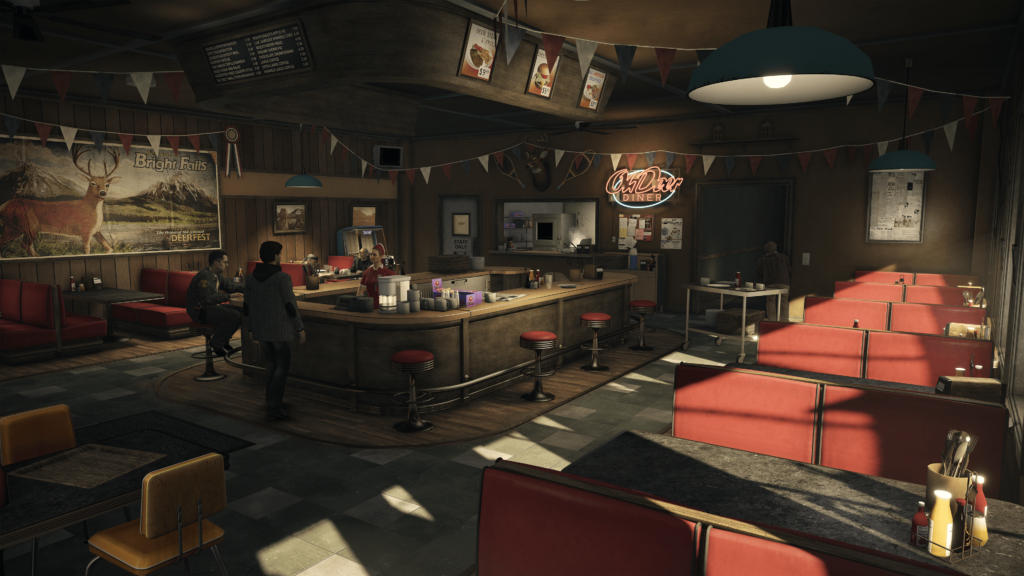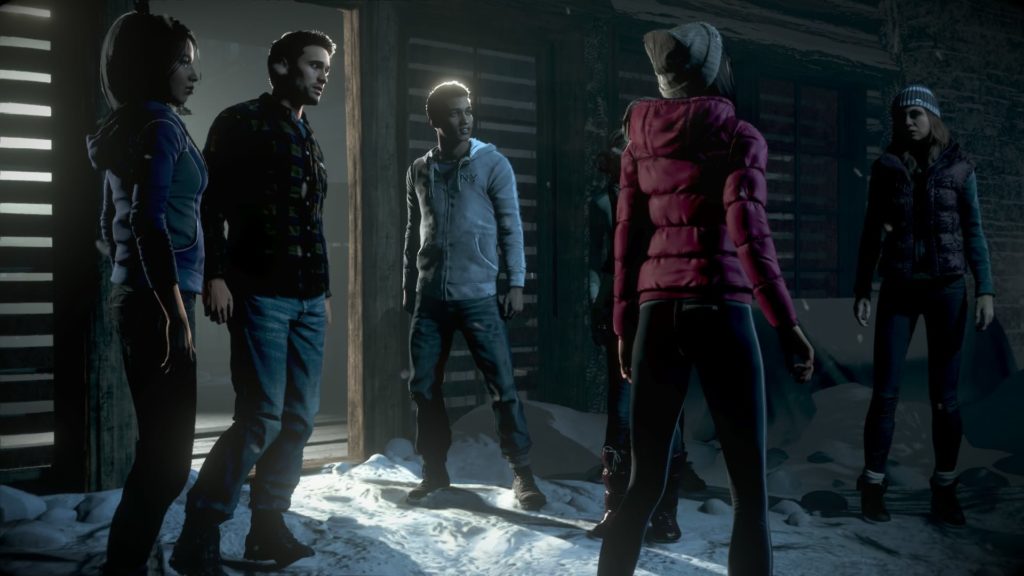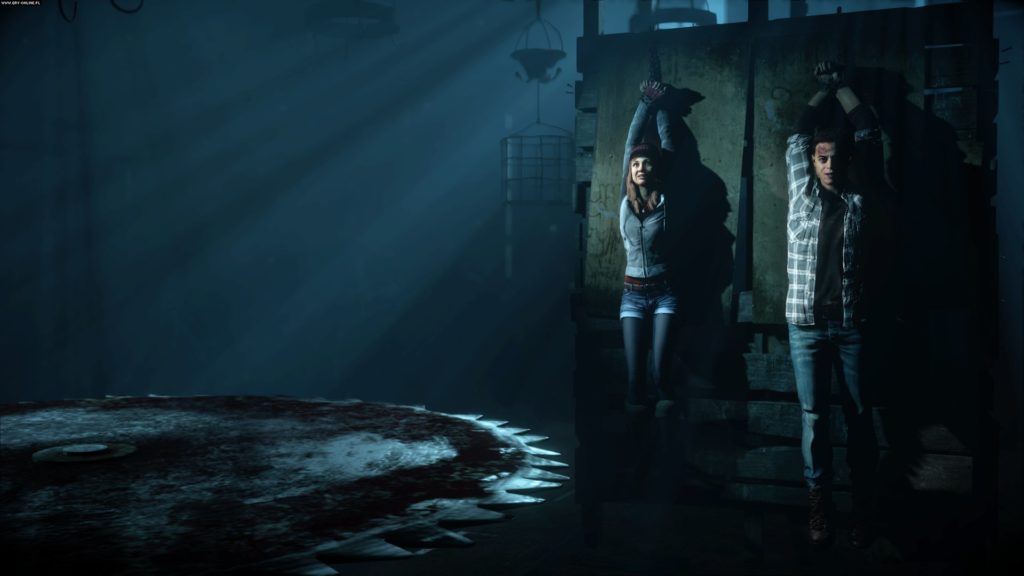
I adored Alan Wake (Remedy Entertainment) and the way it weaves a creative meta narrative into its gameplay. Alan Wake is an author of thriller novels, who has found himself facing depression and anxiety due to writer’s block. Hoping for a reprieve, Alan and his wife Alice travel to a small town, called Bright Falls, Washington. As soon as they arrive in this quaint community, however, things go horribly wrong. Alan wakes up in a car accident with no memory of what happened during the previous week and his wife missing. While desperately searching for Alice, he must face off against darkness-possessed enemies attempting to kill him.
As a writer, I loved the mind-bendy concept of (mild spoiler) Alan’s written words becoming reality due to the high strangeness of the mountain lake area in which he’s visiting. One of my favorite parts of the game was seeking for the manuscript pages scattered everywhere and how they revealed perspectives of side characters or provided clues of future events. It made the experience so much more fascinating to me and made me more invested in the overall world and storyline. I also really enjoyed the way the game mixed in live action elements as a reflection of the way the Darkness and the “magic” of this world twists reality.

On the flip side, my least favorite part of the game was the combat, which involves shining your flashlight on the enemy to disperse the darkness protecting them and then shooting them with your gun. Sometimes — such as when you’re being swarmed by multiple enemies, some of which sneak up behind you — this can feel unnecessarily punishing and sometimes I became so frustrated, I had to turn off the game and chill out until I cooled off and could approach it later. At first I thought it was me and that I just wasn’t a good enough player — until I listed to the Dev Game Club podcast, which assured me that I was not alone in my frustrations. Another thing that would have been good to know before hand is that “easy” is really more like the “normal” mode and “normal” is actually “hard.” If I had known that, I would have opted for the easier mode, which probably would have helped.
Despite that, I love this entire storyline and I’m so excited to play more games from Remedy — particularly since all of the games are connected within the same universe. My plan is to play Control next, followed by Alan Wake 2. (I may also play Quantum Break, since I love time manipulation stories.)

Until Dawn (Supermassive Games) is essential an interactive horror movie. The story revolves around a group of teens returning to a remote mountain cabin a year after the disappearance of their friends (twin sisters). Upon their return, they find themselves facing a deadly killer intent of picking them off in terrifying and cruel ways (a la slasher movies) — as well as other dangers that the mountain presents.
Inspired by the concept of the Butterfly Effect, the game features choice-based mechanics (similar to The Walking Dead or Life is Strange), illustrating the way small choices can result in unforeseen outcomes. In addition, the gameplay also includes quick time events (which I usually hate) and an interesting “don’t move” mechanic (in which the player has to hold the controller completely still) in order to add a sense of urgency and tension necessary in a horror experience. This combination of choices can result in various endings, which range from everyone lives to everyone dies (and multiple combinations in between).

For the most part, Until Dawn is a fun time, these gameplay choices have viable consequences, such as when the player has the option to play it safe or take riskier shortcuts when attempting to save a friend. At other times, it’s not always clear what previous choices led to the current event, which can be frustrating.
Another frustration was the fact that it was not always clear when an action would move me forward in the game, cutting me off from exploration. At multiple points, I dropped off a ledge — thinking it was just an item to pick up — only to find myself unable to return to the previous area and search for more clues and collectables.
There are other instances in which the player’s actions are in direct conflict with the scripted storyline. For example, in one particular instance, the player is presented with the “don’t move” mechanic — but it doesn’t matter how well you perform the action. Every time, no matter what, the character will step out, drawing the attention of the enemy and leading to an NPC’s scripted death. It’s a frustrating moment, because even if the player doesn’t do anything wrong in their gameplay, they are still punished with a terrible outcome. It would have been much better to have the “mistake” be tied to an occurrence not within the player’s expectation of control.
Nevertheless, I had a good time with Until Dawn — and I’m currently trying to decide if I’m going to play it through again just to see different outcomes for the various characters. For those interested, Game Maker’s Toolkit has an excellent video essay on whether or not Until Dawn makes for a good horror movie, and I like their perspective of viewing the experience as being the horror director.
I jumped back into God of War (Santa Monica Studio) — and was surprised to realize that I had left off in the middle of a huge boss battle with a dragon, which was hilarious. During my interim of not playing I also completely forgot all of the controls, so I immediately got curb stomped by the dragon. A bit more fumbling around, though, and I got things under control and defeated the massive dragon. So, I’m ready to get back into it and finally finish the game.
Suckered in by the constant ads, I decided to give Royal Match (Dream Games). The game is essentially what is presented in the ads — a color-matching puzzle game (with a few levels that involve saving the King from a terrible fate). In between levels, you can help upgrade rooms in the palace (though there is no personalization in this), which unlocks prizes to help with gameplay. As far as these types of mobile puzzle games goes, it’s a good time. Nevertheless, I ended up deleting it a few weeks later since it was sucking up a lot of my passive time, and I already have Two Dots for that purpose.
If you’d like to know about the rest of recent culture I consumed, including books, movies, and TV, you can check out my Culture Consumption for December.